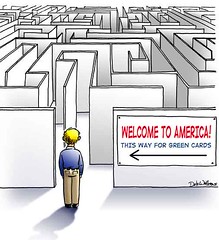 Being a Canadian in the United States for the last nine years has been an interesting adventure, to say the least. Although our nations are neighbours, there can be two more different approaches to the same problem so close to each other.
Being a Canadian in the United States for the last nine years has been an interesting adventure, to say the least. Although our nations are neighbours, there can be two more different approaches to the same problem so close to each other.
I can’t claim to be an expert on how Canada processes new immigrants, but I can say that it has to be better than what has happened in the US.
Nine years ago, I started out on the NAFTA Free-Trade visa, the TN-1. This is a non-immigration visa, which is restrictive in the occupations that you can work in, but essentially allows highly-skilled Canadians, Americans, and Mexicans to work in the free trade zone, a term I use very loosely in this context.
In 2001, my status was migrated by my previous employer to an H1-B. This is a much more formal visa and is used for skilled workers from around the world. It is also infamous for its quota system, and is the bane of most (if not all) high-tech firms who insist on recruiting the best talent from around the world to work in the Unuted States.
In some respects, while the off-shoring trend that was so big a concern a few years back (still?) is founded on a number of different economic realities, the driving force was the restrictive nature of the H1-B visa. I encountered a version of this when I changed employers and transferred my H1-B from employer A to employer B. When I did this, I could not leave the US, for any reason, until I had my new H1-B without forfeiting the entire process.
One of the conditions I had for switching employers was that employer B would start the Green Card process for me and my family. This process alone has taken 3.5 years, and from what I can tell, being an employment-based application from a Canadian means that I haven’t had to wait nearly as long as some of the people who apply under other circumstances or from “less friendly” nations.
This process is approaching (we hope) its final phase, as there is talk from the people assisting us that there is a chance that we may be processed through the final stages in late 2008 or early 2009. But, as with all things related to this process, this is still very much speculative.
Whew.
So, as a citizen of the United States reading this, you are likely saying “So what?”, or “How does this affect me?”. Frankly, it doesn’t. But, in a fundamental way, it does.
As a nation built almost completely on immigration, the United States has become increasing isolationist, especially in its immigration policies. Mostly at a political level. Where the conflict appears to be developing is between the political agenda and the economic needs of the US economy. US firms are reliant on importing the best and the brightest from around the world. These same firms are now finding increasing resistance from these highly-skilled employees who are looking at the current state of the US economy and the incredibly restrictive immigration criteria, and choosing to walk away, or choose other more lucrative and less restrictive opportunities.
As a person involved in this process, I can say that up until late last year, when I recieved my EAD, I was in effect an indentured serf, beholden to the company for which I worked, which none of the options or flexibility that my US colleagues had available to them.
I own a house. My children go to school in the town where I own my house. I pay US, not Canadian, taxes. I pay property tax.
However, in the eyes of the United States government, I am considered “three-fifths of a person”. A person bound to this country but not of this country.
The truly American among you may say “Shut up and become a citizen”. I chose not to. I have chosen to retain my personal Canadian Identity, those things that I hold dear that separate Canadian and Americans. I retain my Canadian passport. My youngest son holds dual-citizenship.
I have chosen to make a life in the United States. However, the process that I have been involved in does not allow me to recommend this path to any other Canadians.
To other Canadians, I say: Stay home. Make Canada the best it can be. Make it a truly integrated player in the Global Economy.
To the United States, I say: Wake up. Your destiny has come, and gone. And the way you treat your immigrants is a clear demonstration of that.
Some have said that the United States is a fading empire, most-often compared to the Roman Empire. However, as this piece in the LA Times states, even an ancient empire, in its fading glory, understood how you become great: You become more than the sum of your parts.

Leave a Reply